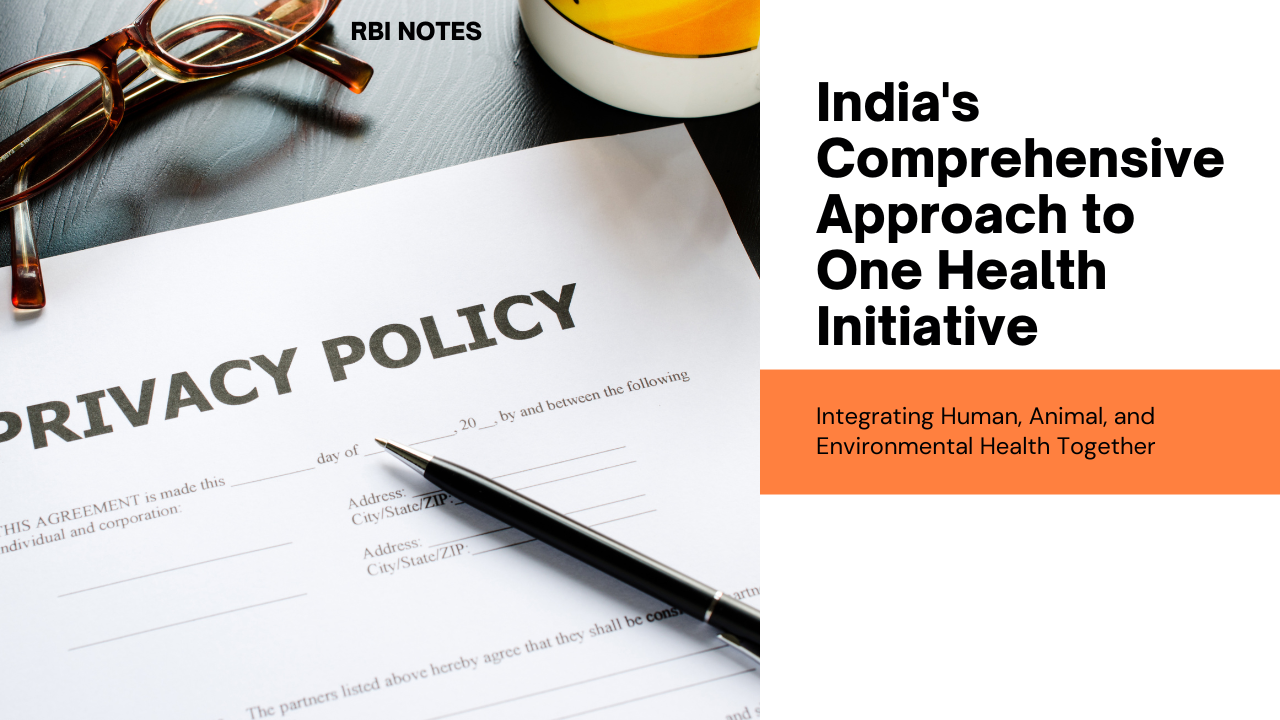India is taking significant steps in establishing a unified legal and policy framework for the ‘One Health’ initiative, a comprehensive approach that integrates the health of humans, animals, and the environment to address complex challenges such as zoonotic diseases, antimicrobial resistance (AMR), and food safety. This initiative is a collaborative effort led by the Ministry of Health & Family Welfare (MoHFW), NITI Aayog, the Ministry of Law and Justice (MoL&J), the Ministry of Environment, Forest and Climate Change (MoEFCC), and the Department of Animal Husbandry and Dairying (DAHD) under the Ministry of Fisheries, Animal Husbandry & Dairying (MoFAHD).
Key Highlights:
- Leadership and Vision: India is at the forefront of drafting a legal framework for the ‘One Health’ initiative, showcasing its leadership and advanced thought process in addressing health challenges that are interconnected across human, animal, and environmental sectors. Dr. VK Paul, Member (Health) of NITI Aayog, emphasized that India’s proactive approach not only benefits the nation but also sets an example for the world. He noted that the COVID-19 pandemic has underscored the importance of the ‘One Health’ approach in managing zoonotic diseases and the linkages between ecosystems.
- Multi-Sectoral Collaboration: The ‘One Health’ initiative is a multi-sectoral and multi-stakeholder effort that requires collective and coordinated action for success. Health Secretary Shri Apurva Chandra highlighted that more than 75% of human diseases are zoonotic, stressing the importance of preventing and managing risks at the human-animal-plant interface. The initiative aligns with Prime Minister Narendra Modi’s vision of “One Earth, One Health.”
- National Action Plan and Legal Framework: India is developing National Action Plan (NAP) 2.0 to address AMR and other critical health issues under the ‘One Health’ mission. The initiative also involves aligning Indian laws with international standards and ensuring cross-sectoral responses to health challenges. The current legislative framework, with its separate laws for human health, animal health, and environmental protection, has some gaps and overlaps that need to be addressed.
- Environmental and Legal Integration: Ms. Leena Nandan, Secretary of MoEFCC, emphasized the need for a unified approach among different ministries to achieve ‘One Health’ goals. The Environment Ministry is committed to making necessary provisions under existing wildlife and environmental Acts to ensure the health of humans and the conservation of wildlife.
- Support from the Ministry of Law and Justice: Shri Rajiv Mani, Secretary of MoL&J, reiterated the ministry’s support in amending or updating existing laws to align with the ‘One Health’ principles. This alignment is crucial for protecting the health of all species, including animals and the environment.
National Consultation on Legal Environment Assessment:
The Centre for One Health, National Centre for Disease Control, and Directorate General of Health Services organized a two-day multi-stakeholder National Consultation on Legal Environment Assessment for ‘One Health’ activities in India on June 27-28, 2024, in New Delhi. The consultation focused on assessing the current legal framework, fostering multi-sectoral dialogue, developing actionable recommendations, and promoting inter-sectoral collaboration to support the ‘One Health’ initiative.
This comprehensive approach aims to strengthen India’s legal and policy frameworks, ensuring they are conducive to the integrated ‘One Health’ approach, which is vital for addressing the interconnected health challenges of our time.
India’s unified legal and policy framework for the ‘One Health’ initiative highlights the importance of integrated health policies across human, animal, and environmental sectors. This comprehensive approach is vital knowledge for aspirants of RBI Grade B and other competitive exams, as it aligns with topics included in the RBI Grade B syllabus. Understanding such initiatives can aid in preparing for the RBI Grade B exam pattern, which often includes questions on current affairs and public health policies, potentially impacting future RBI Grade B salary expectations based on sectoral developments.


